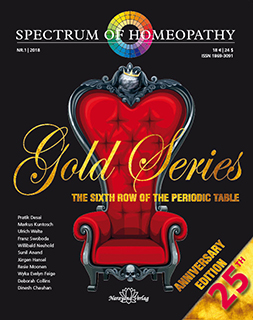

Blog archive
Follow us
Homeopathy and the world
This blog talks about interrelations of homeopathy and holistic ways of healing with the world beyond medicine, with spirituality, science and politics. The homeopathic way of thinking and questioning about problems, crises and solutions is extended to encompass more than issues of individual health. During two hundred years of work with crises and suffering we have developed a holistic way of looking at contexts and a specific way of listening, which may prove to be very helpful in collective contexts as well. In a loose series of articles I wish to show this by different current issues. This work is licensed under a Creative Commons License (Attribution-NonCommercial-NoDerivatives 4.0 International (CC BY-NC-ND 4.0)). You may distribute and reproduce it in accordance with the license terms.
(Not being a native speaker I apologize for any mistakes and appreciate any kind of amendment.) .
Jörg Wichmann, November 2017
BLOG
Homoeopathy and Compassion – a translation
We are always using the word Homoeopathy as a loanword and describe the meaning, when asked for it. But are we able to actually translate it? This is easier as one might think, but the result is somewhat surprising. The old Greek word of παθαίνω 'pathaino‘ has the meaning: to suffer, to befall. From the Latin language we know this word as passio, the suffering and also the emotion. Our word passive also belongs here, and as well passionate. Suffering in a similar way as someone else or make something (the remedy) to be similar to someone´s suffering, is about going with that suffering and not against it. That was Hahnemann´s idea contrasting “homoeo-“ and “allo-“. “With” in Latin is “cum”, which we find as “com-“ or “con-“ in many European languages. So combined with passio the word compassion is easily built. Compassion is to go with someones feelings and sufferings, to share them and be similar. – As we have no word meaning “feeling similar”, the closest possible translation of “Homoeopathy” seems to be Compassion.
A great word, compassion, a word for a great feeling, which in Buddhism is considered to be the highest one we are capable of. And when in Christianity the word love is used, it is not about personal love (έρως, `eros‘), but about αγάπη, `agape’, the general love of humanity.
As homeopaths we have thus taken up a very big cause, since homoepathy is aiming at a lot more than the repair of individual ailments. In his main work Organon the founder of this art, Samuel Hahnemann, says in § 4: “He [the homeopathic doctor] is likewise a preserver of health if he knows the things that derange health and cause disease, and how to remove them from healthy persons.” Obviously this is not about the ailments of persons who are already sick, but about keeping up the health of all people. Removing all that could make people sick – transferring this claim to our present situation, we see what it would demand of us as homeopaths. Which duty would we have to fulfil taking this demand seriously, how would we have to engage ourselves in society and the world, if we really want to be “homeopaths”, compassionate ones!
You can share this article on:
more than thousand
homoeopathic
books by Narayana
________________
more than thousand
homoeopathic
books by Narayana
________________
more than thousand
homoeopathic
books by Narayana
________________





